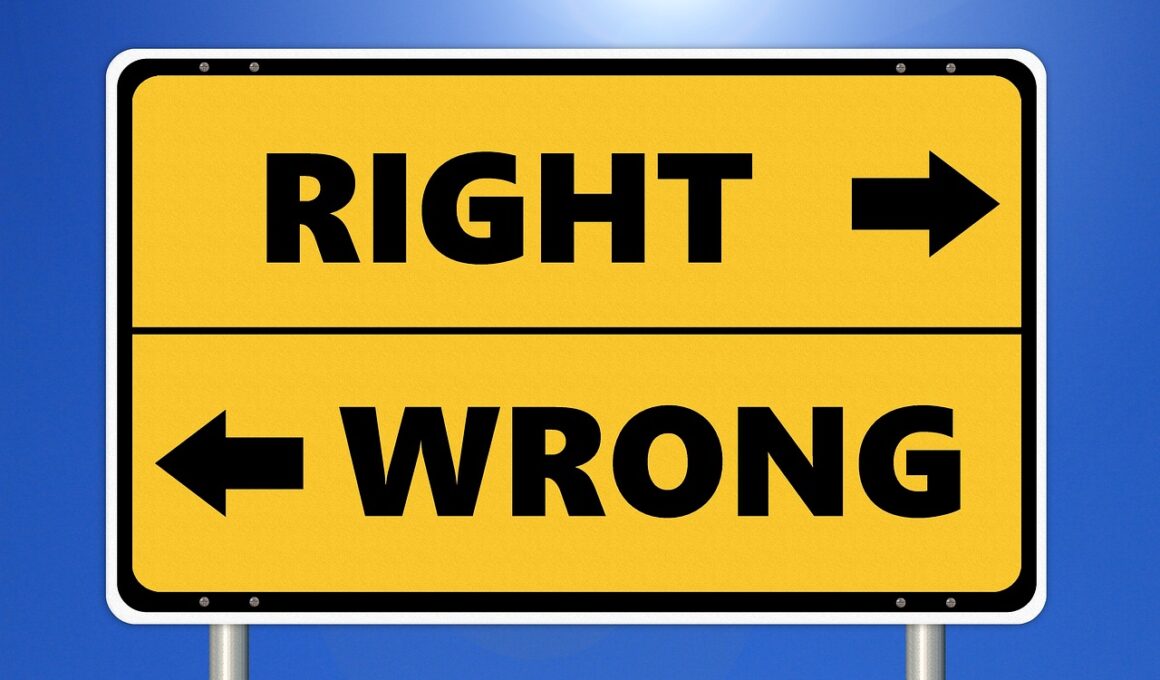Mechanisms for Reporting Ethical Violations in Sports
In today’s competitive sports environment, mechanisms for reporting ethical violations play a crucial role in maintaining integrity. These systems provide athletes, coaches, and staff with channels to speak out against misconduct without fear of retribution. Establishing clear reporting protocols is essential for fostering an atmosphere of trust and transparency within organizations. Confidentiality is a key aspect of these mechanisms, ensuring that individuals can report issues safely. This process might include anonymous reporting options or dedicated ethics hotlines. Training sessions on ethics for athletes and staff can help raise awareness about available reporting tools. Additionally, ethical guidelines should be easily accessible for all, promoting a culture of accountability. Implementing these measures helps protect the rights of whistleblowers, ensuring their voices are heard. Organizations must also actively encourage reports by promoting a zero-tolerance policy towards violations. Use of modern technology, such as apps and online platforms, can facilitate efficient reporting. All these elements combine to create a robust framework that empowers stakeholders to address and confront unethical conduct, ensuring fair play and adherence to sportsmanship standards.
Following up on reports of ethical violations involves a structured approach. Once an issue has been reported, an ethics committee typically conducts an initial assessment to determine its validity. This process requires thorough investigation procedures to ensure that all allegations are taken seriously and evaluated carefully. Gathering evidence, interviewing involved individuals, and reviewing relevant documentation form the backbone of these investigations. Transparency during this stage is key; however, confidentiality must still be maintained to protect the identities of those involved. The findings of the investigation should be documented comprehensively and presented to the ethics committee. Depending on the outcomes, further actions can be taken, including disciplinary measures against violators, which may vary based on the severity of the misconduct. Communication is vital, as stakeholders should be informed legally and ethically without compromising ongoing investigations. Furthermore, periodic reviews of the effectiveness of these mechanisms should be conducted to enhance the response system continually. Stakeholders, including athletes, should have opportunities to provide feedback on the reporting process. This continuous loop of reflection helps improve ethical standards within sport through diligent governance.
Importance of Ethics Committees
Ethics committees play a pivotal role in overseeing the integrity of sports organizations. These committees are often composed of a diverse group of individuals who bring different perspectives and expertise to the table. Their primary responsibility is to ensure adherence to ethical guidelines and to review any ethical concerns that arise. By having a dedicated body focused on ethics, organizations can better manage and mitigate risks associated with violations. Committees conduct regular training sessions to keep all stakeholders informed about ethical standards and reporting processes. Moreover, they are responsible for promoting an organizational culture that values honesty and fair play. Regular evaluations of the code of conduct are necessary to ensure its relevance with changes in sports governance. Ethics committees should also work on developing best practices for maintaining ethical integrity in their sports contexts. They need to be approachable and loyal, allowing stakeholders to feel comfortable engaging with them. This relationship fosters trust between athletes and governing bodies, ultimately promoting a healthy sporting environment characterized by adherence to ethical principles.
Staying ahead of ethical issues in sports governance requires a proactive approach. Monitoring trends in misconduct, such as doping or harassment, helps organizations anticipate potential violations. Conducting research and seeking advice from experts in sports ethics can prove instrumental in developing preventive measures. Furthermore, organizations should prioritize creating awareness campaigns that educate athletes and staff about their rights and responsibilities. This educative approach can involve workshops, webinars, and distributing informative materials that promote ethical behavior. Also, forming partnerships with relevant stakeholders, including sports federations and anti-doping agencies, enhances the effort to uphold integrity. Regularly engaging with these organizations allows for shared insights and resources, leading to improved governance. Moreover, implementing reward systems for ethical behavior serves to motivate compliance among athletes and staff. All these practices combined contribute to a supportive environment where ethical considerations become a priority. Engaging with external auditors presents another avenue for reviewing governance practices effectively and supporting improvements. Organizations can foster greater compliance and understanding by actively adopting these measures in their ethical frameworks.
Building Trust Through Transparency
Transparency is essential for building trust within all levels of sports organizations. Stakeholders, including athletes, coaches, and fans, demand accountability in managing ethical violations. To ensure collective belief in the fairness of governance, organizations must foster open communication about their reporting processes and outcomes. Regularly publishing information on cases handled by ethics committees can boost confidence in the mechanisms’ effectiveness. However, it is crucial to respect the privacy of individuals involved in investigations to strike a balance between transparency and confidentiality. Institutions should also consider creating advisory boards comprising external practitioners in ethics to provide independent oversight and opinions. These boards enhance credibility and help mitigate biases in decision-making processes. Promotion of ethical principles in public forums, such as conferences and symposiums, can raise awareness and reinforce commitment to fairness in sports. Additionally, providing continuous education on various aspects of ethics, including conflict of interest, harassment, and doping policies, supports ongoing dialogue around governance. Engaging athletes and the community in these discussions cultivates shared standards of respect and equality, establishing a unified commitment to upholding ethics across the sports sector.
Accountability is integral to the successful implementation of ethical standards in sports governance. Organizations must establish clear procedures for addressing violations swiftly and effectively. This ensures that wrongdoers face consequences commensurate with their actions, thereby deterring future misconduct. Furthermore, public acknowledgment of disciplinary actions strengthens the governance framework, signaling a commitment to integrity. Communicating the outcome of investigations not only informs the affected parties but also reassures the wider community of the organization’s willingness to uphold ethical behavior. Regular training on ethical responsibilities and violations provides all staff with knowledge on how to handle issues effectively. This proactive approach encourages a culture of compliance where individuals take ownership of their actions. Part of accountability also involves comprehensive documentation of all reported cases, allowing organizations to evaluate patterns of misconduct and develop tailored strategies to address root causes. Regular audits and reviews of reporting mechanisms are vital to ensuring they remain effective and relevant. Legal advisors can guide this process, offering insights into best practices. Through such careful monitoring, organizations can continually adjust their governance strategies, reinforcing their commitment to ethics in every sports domain.
The Future of Ethical Governance in Sports
As the sports landscape evolves, so too must the mechanisms for ensuring ethical governance. Innovations in technology continue to change how organizations monitor, report, and address ethical violations. Emerging tools, such as data analytics, can provide valuable insights into patterns of behavior, enabling early intervention in potential issues. Organizations should consider investing in these technologies to enhance their ethical frameworks. Additionally, the role of social media cannot be overlooked; it has transformed public perceptions and expectations of accountability. Engaging with audiences through digital platforms enables sports organizations to address issues promptly and transparently. Moreover, there is a growing trend towards participatory governance models, which actively involve all stakeholders in decision-making processes around ethics. This inclusivity builds a stronger community and encourages shared ownership of ethical standards. Educational programs should also adapt to changing landscapes, incorporating current events and ethical dilemmas relevant to the sports world. Lastly, fostering a global perspective on ethics in sports governance can lead to more cohesive standards across borders. Continuous dialogue among international organizations will help maintain high ethical standards as sports adapt to emerging challenges.
In conclusion, establishing robust mechanisms for reporting and addressing ethical violations is vital for the integrity of sports. A culture of ethics promotes fair competition and mutual respect among all stakeholders involved in sports. By investing in training, transparent communication, and accountability, organizations can enhance their effectiveness in dealing with ethical breaches. The ongoing engagement of ethics committees and stakeholders is essential for ensuring that violations are properly addressed. Furthermore, continual assessment and adaptation of ethical guidelines will help organizations remain resilient in the face of challenges. Emphasizing education and awareness campaigns fosters a shared understanding of ethical principles, creating a unified front against unethical practice. Stakeholders must feel empowered to speak out, knowing that there are safe reporting mechanisms in place to support them. Technology should be leveraged to facilitate communication and improve reporting processes. As we look to the future, the integration of innovative solutions will redefine how ethics operate in sports governance. Ultimately, by prioritizing ethics, sports organizations can uphold their integrity, respect for athletes, and competitive spirit, enriching the sporting experience for everyone involved.


